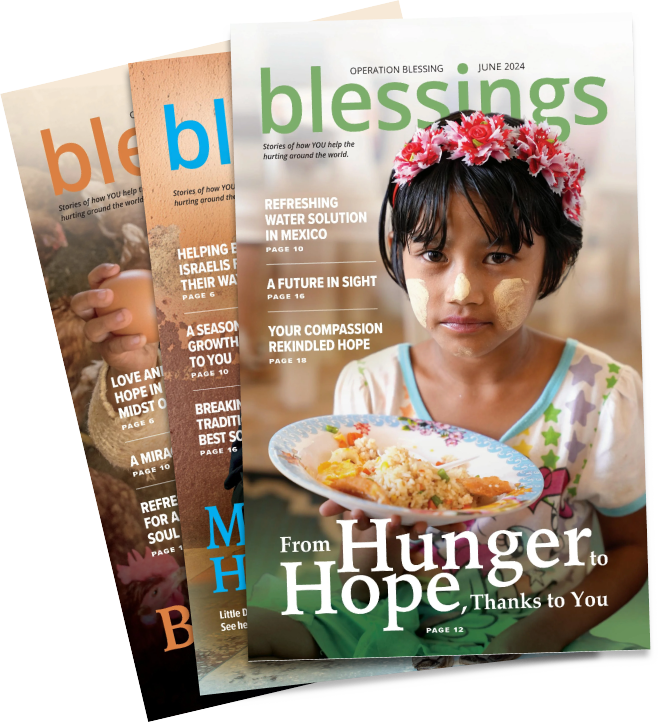What Is Food Insecurity?
Have questions about Operation Blessing? Take a look at the answers to our most frequently asked questions below or visit our What We Do pages to learn more about our core programs. Still have questions? Feel free to contact us!
Ask someone what food insecurity is, and you may get a lot of different answers. Some might say food insecurity is synonymous with hunger. Others may equate it to food shortages or food scarcity. While these both have similarities with food insecurity, each refers to a very specific type of hunger problem. These questions examine many of those aspects to clarify what exactly food insecurity is and how to address it.
What is food insecurity?
Food insecurity is an interruption of food consumption, often due to lack of resources. Simply put, many people don’t have consistent nutritious meals on a daily basis. This can be due to unemployment, underemployment, lack of mobility, or even poor access to nutritious food. Many people have steady income, but don’t make enough to pay their expenses, putting them in a position where they cannot afford as many groceries as they need.
What is food security?
Food security refers to having a consistent amount of nutritious food. This condition is marked by regular nutritious meals minus interruptions due to lack of resources, mobility issues, or adverse circumstances.
What is low food security?
Low food security generally refers to a lack of quality nutritious food, or a lack of variety in food options to cover the nutrients needed for good health. A diet high in fats, fast food, without balance could fit this definition. An example would be someone who does not live near a grocery store and eats a diet consisting of less nutritious convenience foods or carbohydrates. This scenario provides an adequate caloric intake, but does not provide recommended levels of nutrition.
What is very low food security?
Very low food security refers to inconsistent food consumption patterns, many times due to lack of resources. It is virtually synonymous with food insecurity. It involves a lack of recommended total food intake often by missing meals due to the lack of food.
Are food insecurity and hunger the same thing?
Food insecurity is the lack of a necessary amount of food based on guidelines of what a person should consume on a daily basis. Hunger can be triggered by a lack of food, or missed meals, but food insecurity refers to a condition of not getting enough nutritious food. Hunger is a bodily response to the lack of food, which could be due to lack food or simply temporary circumstances.
What is hunger relief?
Hunger relief refers to programs and initiatives to provide adequate healthy food to people who are food insecure, facing food shortages, or experiencing the physical condition of hunger. Operation Blessing friends have done this in a number of ways including:
- Distributing food to food banks and food pantries
- Assisting with the distribution of food to those in need
- Providing nutrition programs to those in need
- Providing microenterprise and skills training programs to help impoverished people earn money for food
- Providing agricultural and animal husbandry programs to help people grow their own food
Are food insecurity and food scarcity the same thing?
Food insecurity refers more to being unable to get access to available food for a myriad of reasons. An example would be someone who does not earn enough to pay for utilities and adequate groceries. The groceries are available in the store, but in this example the person cannot afford them. Food scarcity focuses more on the total supply of food available to a set population in a geographic area. An example of food scarcity would be a country that does not have enough food reserves to feed its population. The overall lack of food will also impact people with adequate financial resources and mobility. This can lead to food insecurity, hunger and even famine.
Are food insecurity and food shortages the same thing?
Food shortages again focus more on the available supply of food to a population in a given geographic area. An example would be empty supermarkets after they are raided before a deadly hurricane hits. This type of food shortage can lead to food insecurity as people are now scrambling to find enough food to eat.
Is food insecurity the same as a famine?
A famine refers to an extreme, intense, and severe lack of food resources for a population in a set area. This refers to conditions where there is widespread hunger and food scarcity, with food shortages impacting the general population indiscriminately. Famines are often related to weather events such as drought or flooding that wipes out crops. A person facing food insecurity has food resources available. They just cannot access them for a number of factors like income, mobility, weather, or extenuating circumstances.
What are some causes of food insecurity?
Food insecurity can be the result of a number of possible causes. Some major causes include unemployment, underemployment, single parenthood, being elderly, sick, or disabled. Food insecurity can also impact these groups in a number of ways. Depending on the circumstance it can lead to a lack of adequate nutrition, insufficient variety of food, and inadequate food supplies.
Are most people facing food insecurity poor?
The belief that only poor people lack food security is not always the case. Anytime someone’s access to adequate amounts of healthy nutritious food is blocked, they are not food secure. Many single mothers have steady jobs but cannot afford enough groceries due to the cost of living. This person is not necessarily impoverished, but they are in a position where they are inhibited from getting enough healthy food. Likewise, a senior citizen may live comfortably at home, with a steady income but may lack the mobility to get to the store as often as they need.
Are most people facing food insecurity unemployed?
While unemployment can be a major cause of food security problems for many, there are large numbers of people who are employed who cannot assure enough daily nutrition for themselves and their families. Some people who lack food security work regular jobs but do not make enough to cover all of their expenses. While some people lacking employment receive government subsidies.
How has COVID-19 contributed to food insecurity?
The pandemic also caused food shortages as people purchased surpluses of food for the expectation of staying at home for extended periods of time. Another issue is the fact that many people cannot leave their homes as much as they need due to pre-existing health conditions. Thus, they cannot get to the grocery store as often as they need. And some food industries experienced disruption to growing, harvesting, processing, and distributing food due to shut downs. In addition to diminishing available food supplies, this has also resulted in higher food prices. Meanwhile, many children lost regular access to free school lunches.
What are some ways to fight food insecurity?
There are a number of ways to help remedy food insecurity and help bring hunger relief to those who have an immediate need for food help. Food insecurity can be addressed directly by providing distribution of groceries and essential items to people struggling to put regular healthy meals on the table.
You can also address this type of hunger problem through helping people with skills training, agriculture projects, and small business support, so that they can earn better income. This can allow them to remain food secure far into the future.
What are some Operation Blessing programs targeted at battling food insecurity?
Operation Blessing offers a number of programs that help target food insecurity in the United States as well as worldwide. Our Hunger Strike Force regularly sends out fleets of semi-trucks with food and beverage for the needy. Through this program we supply food banks and food pantries with groceries for needy families who are facing food security issues. Worldwide we also offer food distribution programs as well as skills training, microenterprise, and farming programs to help mitigate hunger.
How can I Help Fight Food Insecurity In America And Worldwide?
Become an Operation Blessing partner and help feed hungry families, provide clean water, deliver emergency relief, and much more. Your support helps secure food for individuals and families who do not always know where that next meal is coming from. Your generous gifts allows us to provide groceries and resources to help people overcome the vicious cycle of hunger and food insecurity.
Works Cited
“3. Food Shortage.” archive.unu.edu, archive.unu.edu/unupress/unupbooks/uu22we/uu22we09.htm. Accessed 7 Oct. 2020.
“Food Insecurity | Healthy People 2020.” healthypeople.Ggov, 2014, www.healthypeople.gov/2020/topics-objectives/topic/social-determinants-health/interventions-resources/food-insecurity.
“Food Scarcity: The Timebomb Setting Nation Against Nation – Our World.” unu.Eedu, 2012, ourworld.unu.edu/en/food-scarcity-the-timebomb-setting-nation-against-nation.
“The New Face of Hunger.” National Geographic, 2019, www.nationalgeographic.com/foodfeatures/hunger/.
“What’s the Difference between Food Insecurity and Hunger?” WebMD, www.webmd.com/diet/qa/whats-the-difference-between-food-insecurity-and-hunger. Accessed 6 Oct. 2020.

BLESSINGS MAGAZINE
Making a difference in the lives of hurting people around the world!
Each month, Blessings magazine is full of stories about how faithful friends like you are sharing God's love by alleviating human suffering. You can join them! Subscribe today to read more.
GET INVOLVED
Put Your Compassion into Action.
Join Operation Blessing in bringing hope to the hurting across the U.S. and worldwide.
Drew Friedrich


